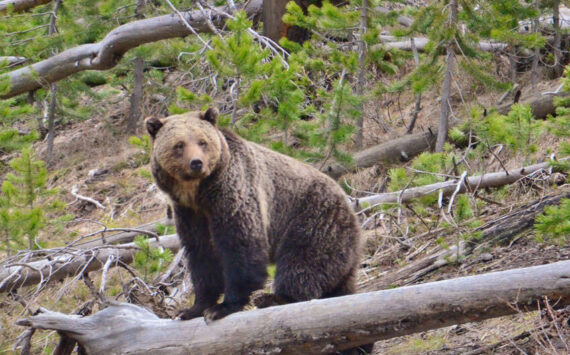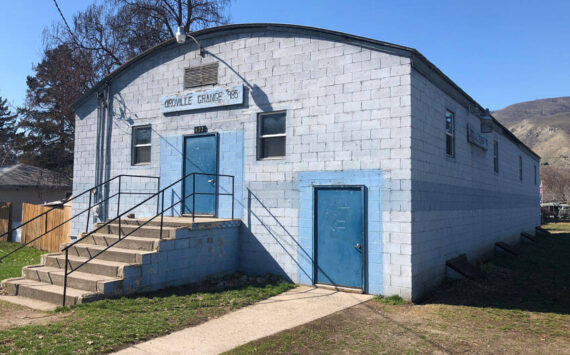

Keith Collier, Train Master of the Cascade and Columbia River Railroad, gives a presentation to the Oroville Chamber of Commerce at their Thursday, April 14 meeting. Photo by Gary DeVon
OROVILLE – Keith Collier, Train Master with the Cascade and Columbia River Railroad made a presentation to the Oroville Chamber of Commerce on the short lines impacts on the local economy.
Collier’s presentation last Thursday, March 14, was the same one he and Chris Branch, Oroville’s director of Community Development, gave at an economic development meeting earlier in the year.
The line runs between Oroville and Wenatchee and has its office in Omak. It built as part of the Great Northern Railroad, which operated from the 1800s to 1970, said Collier. The Great Northern line was taken over by the Burlington Northern in 1970 and the Oroville to Wenatchee branch of the railroad was operated by BNSF until 1996 when it was purchased by Florida-based RailAmerica and began operation as a short-line railroad, one of several the company owns across the nation.
Collier said that short lines, like the Cascade and Columbia River Railroad succeed, because he feels they are more like a “mom and pop” operation. He said the Oroville to Tonasket line has been successful over the years because overall operating costs are less than the larger operations.
The CCRR had its biggest year in 2006 when they shipped 8584 railcars, the equivalent of 25,752 semi-trailer loads. Today the rail line expects to ship about 3500 railcars in 2011, the equivalent of 10,560 truckloads. The reduction has much to do with Canadian sawmills reducing their business by 65 percent. Now much of the mill’s production goes through Princeton and then is further shipped to Japan, he said.
The shortline had to learn to work smarter, cutting staff in half and adopting new technology that has helped it to remain profitable, according to Collier.
The Cascade and Columbia River Railroad, like Oroville, has also benefited from the 2008 designation of Highway 97 from the Canadian Border to the Oroville railhead as a heavy haul corridor (see related story). The designation allowed Canadian trucks to bring in heavier loads that were then loaded onto railcars in Oroville for shipment throughout the United States – with most of the goods continuing from Wenatchee on the BNSF line. He said the heavy haul corridor and the company’s DIAMOND service has led to new customers for the railway.
“The heavy haul corridor led to Weyerhaeuser shipping eight to 15 cars per week of dimensional lumber to move south. We would have never captured this business if it was not for the heavy haul corridor,” Collier said. “It also led to Ash Grove Cement which moves 96 cars north each year – which has taken about three times that many trucks off I-5.”
Collier said one major reasons the Canola Crushing operation located in Oroville was because of the heavy hall corridor and the railway expects Carbon Cycle Crush’s efforts will result in business for the shortline going both north and south.
According to Collier’s presentation, by volume, the company’s biggest customer is Weyerhaeuser, which employs 1800 people statewide. The next biggest customer is Oroville Reman and Reload, which has 55 employees in Oroville area and subcontracts jobs that employ 30 more. Columbia River Carbonates is next with 73 employees in the state and fourth is Central Washington Grain, which employs 36 people in the state. All of these jobs pay better than minimum wage, he said.
“We want to keep as many dollars in the communities we serve as possible,” Collier said. “The community of Oroville has done an excellent job in marketing themselves… I think the future economic picture looks pretty good compared to a lot of areas.”
Robin Stice owns and operates Eden Valley Guest Ranch with her husband Pat. They also raises grain on their property. She asked Collier if the railroad would start shipping local grain again as the cost to ship by truck has gone up as fuel prices rise.
Collier said that using the railroad to ship grain was a possibility and said he’d be happy to meet with area farmers to discuss the possibilities.
During its shortline’s peak, five trains a week made their way between Wenatchee and Oroville, now the railroad averages three per week. Collier said the transportation of goods on the railroad makes both economic and environmental sense, as it takes much less fuel per ton of goods pulled by diesel-electric locomotives compared to hauling by truck. Another benefit is the number of trucks it takes off the highway.
“Could you imagine the number of extra trucks that would be on the road if goods weren’t shipped by rail?” he asked.







